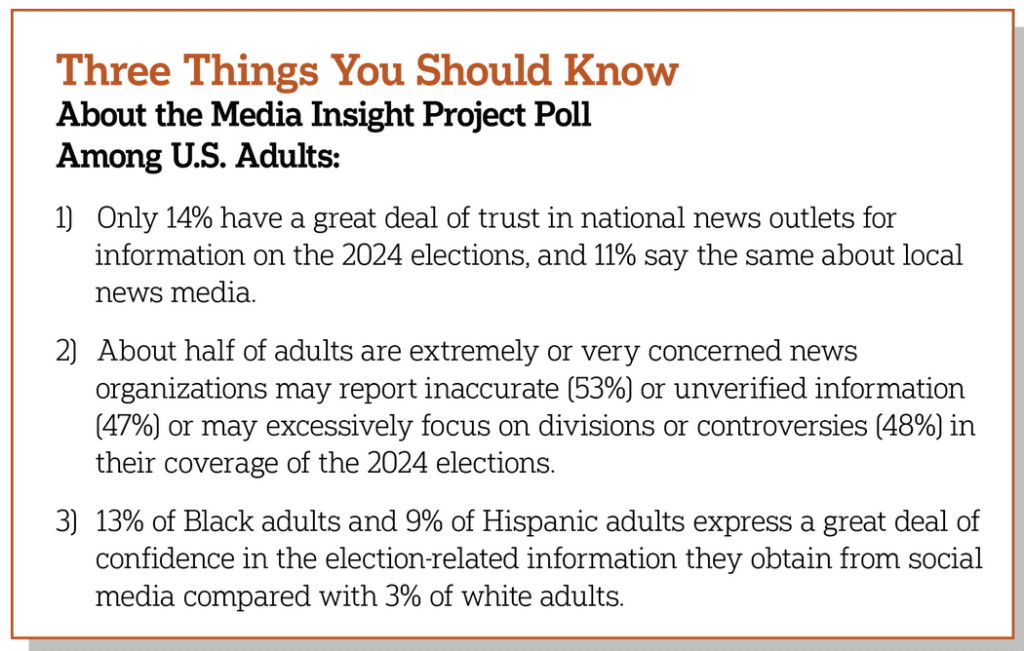Search Posts
Recent Posts
- Dr. Rosemary Costigan Named President of Community College of Rhode Island June 19, 2025
- RI Veterans: Did you know? 19.06.25 (Military Funerals, Job Fair, Benefits, Events) – John A. Cianci June 19, 2025
- East Providence First in U.S. to Equip All Firefighters with PFAS-free Gear June 19, 2025
- We Cook! Mill’s Tavern Saffron Bouillabaisse with Tarhana Lobster Jus June 19, 2025
- Rhode Island Weather for June 19, 2025 – Jack Donnelly June 19, 2025
Categories
Subscribe!
Thanks for subscribing! Please check your email for further instructions.

API, AP study: Election insights – understanding public preferences in news coverage in 2024
The public relies heavily on local and national news organizations as sources for news about elections, but many adults have concerns about the reliability of the information they get, according to a new survey by the Media Insight Project, a collaboration of the American Press Institute and The Associated Press-NORC Center for Public Affairs Research.
Most adults follow news about presidential (77%) and local and state elections (64%) at least somewhat closely, and more report frequently receiving news about elections from national (50%) or local (39%) news outlets than other sources such as friends or family (21%) or individuals on social media (19%).
Although most adults, regardless of age, race or ethnicity, or partisanship, tune into news about elections, only 14% express a great deal of confidence in election-related information they receive from national sources, and 11% say the same about local news media.
In particular, people are worried about the news containing misinformation and amplifying divisions. About half of adults say they are extremely or very concerned about news organizations reporting inaccurate information (53%). Almost as many worry news outlets will report unverified information (47%) or focus too much on divisions or controversies (48%).
The survey also reveals some important differences based on people’s race or ethnicity, age, or political affiliation. For example, Black adults (13%) and Hispanic adults (9%) are more likely than white adults (3%) to have a great deal of confidence in the news about elections they obtain from social media.
Younger adults are less engaged with election news and have less confidence in the media than older adults, but older adults have more concerns about inaccurate election news.
While there are clear differences across party lines about confidence in the news media, there is also common ground about what Democrats and Republicans want from media coverage. Both Democrats and Republicans want national media to report about candidates’ positions on key social issues and policies (Democrats 82% and Republicans 76%) as well as candidates’ values and character (Democrats 81% and Republicans 75%). Independents are less likely to say they want national media to cover all aspects of the elections compared with Democrats or Republicans.
Despite common perceptions about the country’s growing geographic divisions, the survey finds very few significant differences in people’s attitudes toward election news depending on whether they live in rural, suburban, or urban communities.

The nationwide poll was conducted by the Media Insight Project, a collaboration of the American Press Institute and The AP-NORC Center for Public Affairs Research from March 21 to March 25, 2024, using the AmeriSpeak ® Panel, the probability-based panel of NORC at the University of Chicago. Online and telephone interviews using landlines and cell phones were conducted with 2,468 adults. The margin of sampling error is +/- 2.9 percentage points.
Read the full study, here:
